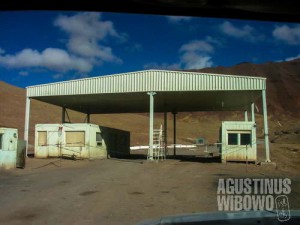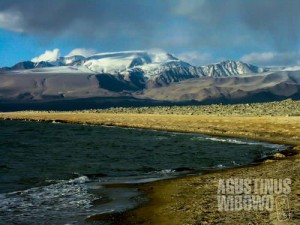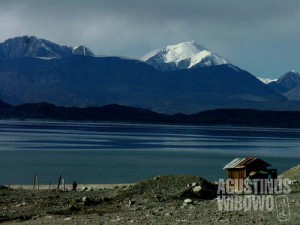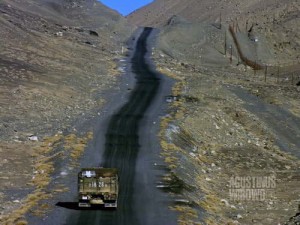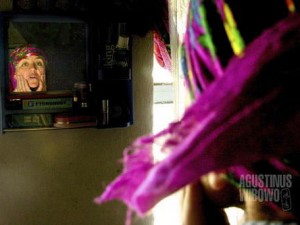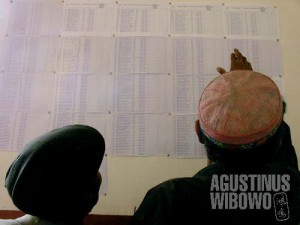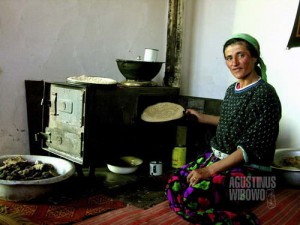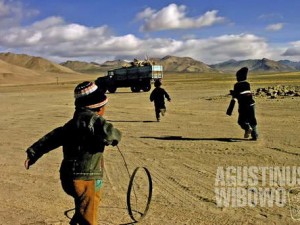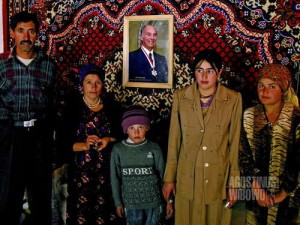Funeral of Zakia Zaki. Photo credit: Safiya Saifi (Pajhwok Afghan News) Today I was struck when a female colleague told me that one of her good friends, a female journalist, was shot to death by mysterious gunmen. Zakia Zaki, director of a radio company, was killed a night before on her own bed. It was scary news. Just about a week before, May 31, 2007, a popular Shamshad TV female news presenter, Sanga Amach, 22 years old, was shot to death. The actual motive and suspects remained mysterious. ‘Honor killing’ was among the possible motives. An honour killing is a murder, nearly exclusively of a woman, who has been perceived as having brought dishonor to her family. The killings are typically perpetrated by the victim’s own relatives or community. Such killings are often regarded as a “private matter” for the affected family alone, and courts rarely become involved or prosecute the perpetrators. Being a journalist in Afghanistan is comparatively dangerous. [read more]
Kabul – An Expatriate Restaurant Is Closed
Notice of the closure of L’Atmosphere, due to tax problem L’Atmosphere, a French restaurant hidden in a small dusty alley in Kabul, is forced to close by the government, due to a tax failure. I have a personal experience with this restaurant. In 2006, the first day of my arrival in Afghanistan, an Indonesian friend of mine took me to the restaurant to watch the opening match of the World Cup soccer championship. I was not interested to watch World Cup, but as he said that it was a public place with giant screen – which he supposed to make watching football much more interesting, I was thinking of a giant screen in the middle of an open field where a crowd of turbaned Afghan men cheered and supporting their favorite teams. I accepted the invitation. Located in unsigned property in a nondescript dusty alley of Kabul, here is one of the renowned expat heavens in Afghanistan This was the perfect hangout place for the expat. After the closure, many of the Kabul foreigners [read more]
Kabul – Those who Survive on Afghan Streets
Ni’mat, the shoe polisher The decades of wars in Afghanistan have left scars on Afghan community. Victims of wars are still visible on busy Kabul streets. War widows and orphaned children beg for donations from the crowds, and poor children also have to work instead of getting access to proper education. The economy disparity causes many people are still not adsorbed into proper occupation. If a father does not make enough money to support his big family, which is very common in Afghanistan, then young children have to start to earn for living. Ni’mat is an 11 year old boy. His name in Arabic means mercy, but his life is not quite a mercy. At this early age, he has to work on streets as shoe polisher. He started this work a year ago, and now he has more responsibilities. His mother does not work, as most women in Afghanistan. His father used to be street worker, hanging around on the street to offer his muscle power. But then, last month, his father got accident because [read more]
Kabul – Life from the Stinky Mountains
Searching for possible “treasures” in the garbage dump of northern Kabul North of Kabul, on the top of barren hills, is located the garbage dump of all waste of the capital. The complete waste, after passes the selection of waste pickers from all around the capital, ends its journey here. Waste pickers, those who try to find treasures from dumps of waste, can be recognized easily. They are people in dirty clothes, with a sack on their backs, and dwindle around Kabul streets or garbage dumps searching for something. Most of the waste pickers in Kabul are children, besides adult men and women. Garbage from the streets is then dumped here, on a hill north of Kabul, as the final dumping point of all garbage in the whole capital. Garbage which makes its way here can be assumed as the most unusable kind of garbage, or we can say the garbage of all garbage. But still, this kind of place may provide life for some people. Lunch, everybody? Waris, 12 year old boy, spends his full [read more]
Kabul – Some Broken Eggs from Kabul to Share
“My eggs are broken… my parents will punish me … keen to help?” Broken Eggs A boy is crying as his eggs are broken on a pedestrian street in Kabul. I was among sympathetic passers-by who donated some coins to this poor boy. Later I found out this is a common scam in the capital, as you may find this trick: a boy crying in Kabul’s many busy streetsnext to broken eggs to gather some symphathy from unsespecting people. Telur-telur yang Pecah Seorang bocah kecil yang menangisi telur-telurnya yang pecah di sebuah trotoar di Kabul. Entah apa yang dipikirkannya. Apakah sang ayah akan menghajarnya karena ia telah menyia-nyiakan uang belanjaan hari itu. Apakah sang ibu akan mencacimakinya karena kecerobohannya. Yang jelas, saya bersimpati dan menyumbangkan beberapa keping uang receh yang disambut dengan tangan yang terjulur dari balik wajah yang tersembunyi itu. Kemudian baru saya mengetahui, bahwa ini adalah salah satu teknik mengemis yang mutahir di ibu kota [read more]
Kabul – Brother Ambassador
The Indonesian Embassy in Kabul Today there is opening of a photo exhibition in the newly renovated Kabul Museum, just across the Darulaman Palace. The exhibition shows some old photos of Afghanistan, taken in the 1970s, about the glorious era of the covered bazaar of Tashkurgan. The covered bazaar now is gone. And European historical site preservation mission is trying hard to return the legendary bazaar back to its golden time. As photographers we were invited to attend the opening ceremony. There were long, long speeches from authorities and historians about the importance of preserving historical sites, the mission of photo exhibition, and about the destroyed bazaar of Tashkurgan. Many of the invited guests are foreigners. I feel a strange feeling surrounded by high class Afghan expats accompanied by their super muscular bodyguards. I am just a little photographer assigned by a local office here. During the speech I noticed a man standing next to me. He also looked at me. I was [read more]
Kabul – Demonstration against Tolo TV
“Go down with Tolo!!!” scream the protesters There is a demonstration in front of the headquarters of the biggest Afghan private TV station, Tolo TV in Kabul, following urge of the Afghan Attorney General on closure of the TV station. According to Abdul Jabar Sabet the Attorney General, the TV Station had made false report on his comment. He claimed that he was saying that the judicial system was not good, but then reported by the TV he was saying it is the country’s system which is not good. Sabet is very unhappy by this report, as this left impression that he was speaking against the government, not the judicial system. The protesters—the supporters of Sabet—also brought the name of religion and Prophet in their action. The scale of the protest is not really huge—some media reports there are 200 protesters, but I just saw only some dozens. Anyway, the protesters claim there would be 500 people joining their action, a number supposed to be alarming for [read more]
Shakhimardan – An Uzbek Island Surrounded by Kyrgyz Mountains
Shakhimardan, an Uzbek “island” surrounded by Kyrgyzstan As artificial as any other thing in Central Asia was the border lines between the countries. The nations created by the Soviet rulers now had to be provided their homeland. Stalin might say, land populated by most Uzbek should be Uzbekistan, those inhabited by mostly Mongoloid Kyrgyz then became Kazakhstan (the Kazakh was called as Kyrgyz) and Kyrgyzstan (of which people was called as Black Kyrgyz). But the matter was not simple in the Ferghana Valley. Ferghana Valley was always a boiling pot in Central Asia. The people were renowned as deeply religious Muslim, if not fundamentalist. It was more than necessary for the Russian to divide this huge mass with the highest population density all over Central Asia. Then, besides the division of ethnics (who were Uzbek, who were Kyrgyz, and who were Tajik), there was a clever intrigue by dividing the border lands to divide the people. Then, the identity in Ferghana Valley [read more]
Tashkent – Flying Home
The Uzbek Airways flight HY553 flight of Uzbek Airways left Tashkent airport at 11:30 exact heading to Kuala Lumpur. I was among the few passengers on that plane. Kuala Lumpur, compared to New Delhi, Lahore, and Bangkok, is a dry destination from this country in the central of Central Asia. This morning there were several flights to Asia, and all were full of passengers, but less than 20 people boarding from Tashkent to Kuala Lumpur. This morning started very messy. It seemed I was not prepared yet to leave Central Asia this sudden. The notorious Uzbekistan immigration officer was not that bad though. My embassy has prepared me with magic letter so that if they tried to find trouble I still have a way out. During my two month stay in the country, I had never registered myself to the OVIR office (Passport and Immigration office), thus my stay was illegal. Luckily the immigration officer was too happy to speak Tajik language with me, chatting about the luck of living in a Muslim country [read more]
Bukhara – Another Incident
My blury photos of Bukhara reflect my blurry mood My days in Uzbekistan seems never be far from incidents. Earlier in Tashkent I lost 400 US$ cash stolen. The other day in Samarkand I broke my camera. Then in Ferghana I experience some night hours in police station. Today, after the surprising climax that I will be thrown to my zero point, I have to experience other incidents at the last legs of this journey. I took a night bus from Tashkent to Bukhara. But I came late. When I arrived in bus station near the Sabir Rahimov Metro Station, the latest to Bukhara had departed. But there was another bus departing to Navoi, 2 hours before Bukhara, and I decided to take this night bus. It was 8 p.m. when I got in. But not until 11 the bus started the engine. I fell asleep since I got seated. Today was an exhausting day, as I was hunting for flight ticket to Malaysia and the fact that I am going home still shocked me. The journey to Navoi takes about 5 hours at night. I couldn’t remember [read more]
Tahskent – Ticket to Indonesia
The Uzbekistan Airways The sudden call from Indonesia does change my travel plan drastically. I decide to go home as soon as possible. My father suffers from heart attack and I know he wants to see me as he worries much about my recent being as ‘a homeless wanderer’. I do miss my parents. Almost every night I dream about them, and these dreams make me nothing but painful. I miss them and I know they do the same. Family relation is more like mythical telepathic connection. “Just go home. What else you need to think? Before you regret for your whole life,” said Rosalina Tobing, a friend of mine who works in the Indonesian embassy. The word regret does have a very strong power. I still have chance to go home, so why not? Rosalina suggested me to buy a ticket as soon as possible. Luckily now there is a promotion of Uzbek Airways which is commemorating its 15th anniversary, and a ticket to Bangkok or Kuala Lumpur costs only 299 US$ payable only in Uzbek sum (the biggest value of [read more]
Tashkent – A Call from Indonesia
An unexpected phone call This morning, my mother sent me an SMS. It says, “Papa wants you to go home for the Chinese new year, there is something to talk about.” I was so surprised. I am unable to call them back as international call is out of my limited balance. I sent them an SMS back but there was no reply. I ask help of my friend in Jakarta to call my family in Java. My friend says that my father was healthy, but he wants to gather in the New Year’s Eve. It has been 4 years already I missed the New Year’s Eve with my family. My father is sick, he gets a heart attack 2 years ago, and I always worry about him day and night during my travel. He always says that he is healthy and fine. But I know he is a strong man and dislike people to sympathize him. Never my father asks from me something, but now, he really begs me to go home. This is a sudden call from Indonesia. It was so sudden that I am still shocked. How about the traveling plan made up recently? I have obtained the [read more]
Ferghana – Police Department Visit
The journey to Ferghana, passing through very high snowy passes. Ferghana valley might be the widest valley in the world. A huge area surrounded by great mountains, sliced into portions of three countries (Uzbekistan, Kyrgyzstan, and Tajikistan) by only-God-knows-how-it-works border lines. I am always interested in visiting Ferghana Valley and experience the life here. Ferghana is said to have the purest Uzbek culture. The people of Andijan is said to speak the purest form of Uzbek language. Ferghana (Fergana, Farghona) is also a hotbed in Uzbekistan. The radical Islamic Movement of Uzbekistan forced Karimov to send troops to secure the area (thus sacrificing some of the civilians) and even force the smaller neighboring countries to support Uzbekistan’s government move against the militants. Karimov actions not only gained protest worldwide (remember demonstration in front of Uzbek embassy in Jakarta) but also difficult times with other Central Asian republics. The people of [read more]
Turkistan – A Journey to Turkistan
A pilgrimage to the holy land of Trkistanrkistan The holy journey to the holy land The train departed from Almaty 1 train station after I had a little incident with station police. I was just informed that taking photos in a train station was extremely prohibited. I was taking photos of the train, passengers, and security officers, and then suddenly a man called me to follow him to a special room. Here I was interrogated by the woman who was the head of the police. I explained that I was just a tourist and I was interested by the Russian train. They let me go after I deleted the photos. Many passengers of the train were students. The way going to Turkistan passes Shymkent, the important southern town bordering with Uzbekistan. Most of the passengers, compared to northbound train routes, were mostly Asians. Southern part of Kazakhstan was dominated by native Kazakh and Uzbek. The holy man The train journey was long. But as here, most passengers were Kazakh and Uzbek, comparatively they [read more]
Almaty – If You WaNNa LIVe
The park may look beautiful and quiet, but it can be dangerous The day started with a quarrel. Lyubova, the owner of the home stay, was not happy that I arrived with a taxi yesterday night. I was in the middle of Almaty downtown, when I realized it was already 7 pm. I was waiting a bus until 11 pm but no public buses at all going to airport area. I forgot, on Sundays all public transport stopped working as early as 6 pm. What a bad luck. I walked under darkness, with only fear of meeting criminals or drunks in my heart, from Respublika Alangy until Tole Bi. I gave up. It was almost midnight. At the end, I had to haggle a taxi (better than staying in a gay bar like last week). The taxi cost 500T. It was much beyond my budget, but I didn’t have any choice. When I arrived at the home stay, Lyubova was sleeping. The next morning, she started the quarrel. “Huh. You can pay a taxi but you cannot pay for your stay!” said her cynically. I just didn’t understand her. I paid [read more]
Almaty – the Golden Man
The busy and colorful “green market” of Almaty During my stay in Kazakhstan, today was the first time I saw a sunny day in Almaty. The city suddenly became lovely and friendly. Somehow now I started to understand how this city had a lovely name, Almaty, which was the original form of its old name, ‘Alma Ata’, which literally means Father Apple. The Chinese call this name as ‘Alamutu’, which might be the closest form the Chinese spelling could make to this city’s name in Silk Road time. Anyhow, it was said that Almaty’s apples were as big as coconut, and it was said the best apples produced here at that time. Now, for a poor Russian dwellers like Lyubova, apple is a luxury in this ‘apple city’, as the price of apples was far beyond their budget. I got used already with Almaty’s high cost of price, and as people coming from financial power below poverty line, I started to know the strategy to keep living in low budget. I [read more]
Karaganda – The Mining Town
Strong Russian influence is felt in Kazakhstan, especially in the northern part of the country Some 200 km southeast ward from the capital Astana is the famous northern town of Karaganda (also spelled as Qaraghandy or Karaghanda). What made Karaganda famous were coal, labor camps, and AIDS. This second biggest city in Kazakhstan after Almaty started its history when a small-scale coal mining settlement was built in 1857, and the mining developed fast after the completion of railway link in early 20th century. The town was actually founded in 1920s by mining slave labors, and the labor camp riots dominated Karaganda’s early history. Mining industries of Karaganda, dominated by coal, included iron, steel work, and ore. Coming from Astana by bus, in early cold morning by a minibus which cost 1000 T a seat from Astana to Karaganda, I saw grey polluted air around the mining town of Karazhal, which supplied ore for industries in Karaganda. As a mining and industry city, I have learnt [read more]
Astana – A Day in the New Capital
Building, building, and keep building Despite of the bitter cold due to the fierce snowfall in this sub-Arctic new capital, I forced myself to go around. As in Almaty, bus network was quite extensive in Astana. The buses were, again similar to Almaty, mostly second hand buses from Germany decorated by graffiti from the former German owners. Astana, behind the frozen bus glass window, looked completely white in my eyes. This capital might be the most artificial city in Central Asia, even I have heard that Ashgabat, the capital of Turkmenistan – another gas and oil rich nation in the region, was comparable. Nobody would expect this place to become the capital of modern Kazakhstan. About a decade ago, Astana was just a wasteland in the middle of nowhere. The location where Astana is, far in the north in the heartland of Kazakhstan, is known for enjoying its extreme weather in scorching hot summers and bitterly freezing winters. Nobody would decide to have a capital here. Many thought [read more]
Astana – The New Capital
Welcome on board The 20 hour journey on a sleeper bus from Almaty to Astana was flat. From the window I saw the massive, flat land of Kazakhstan. My image of green giant steppe, in cold winter like this, was replaced by thick snow layer. Everything was flat and white. The sky was completely grey, adding the sorrow of traveling in Kazakhstan in freezing cold winter. But Kazakhstan was inviting. In this 2nd class sleeper, which cost 20 dollar a seat plus 250 Tenge for bed sheet rental (I tried to refuse but the train attendants said she wouldn’t allow me to sleep on the bedding without the sheets), I shared the compartment with two Mongolian Chinese and a Kazakh woman. The two Chinese men of Mongolian ethnic spoke good Chinese and Russian. They were all from Xinjiang province. One had Kazakh passport and the other, Mr. Ye Shunde, still possessed a Chinese passport. “It’s now easy to acquire Kazakh passport,” said Mr. Ye, “you just need to marry a Kazakh woman and you get [read more]
Almaty – Borat’s Land
Night is coming in Almaty “All people writing about Kazakhstan are telling bullshit!” – Nurslan Kazakhstan was surprisingly much more expensive compared to it was in my short visit in 2004. That time I stayed in Kazhol Hotel and it cost 26$/night. For my student pocket it was enormous amount. But staying in cold, dirty, dark room of Kazkontrakt was indeed uncomfortable and I decided to go back to Kazhol. Kazhol now turned to be a very neat and smart hotel, after renovation. The tiles on the floor were glittering, as it was emphasizing the golden age Kazakhstan enjoying at this moment. The price also skyrocketed. The cheapest room now costs 69$. It was much beyond my budget. I was told by some travelers that the cheapest option in Almaty was dormitory of the bus terminal (10$). But imagining staying in ‘dormitory’, especially in a bus terminal, the idea itself reminded me to many bad experiences of mine in Tajikistan. I preferred to invest just a little [read more]
Almaty – Welcome to Kazakhstan
It’s freezing, dark, and full of cars. My Kyrgyz visa expires today and there is no other thing I can do but to go to Kazakhstan. Kyrgyzstan and Kazakhstan are separated by Chuy River, located not far north of Bishkek. I took a minibus as it cost only 800 Som to cover the 4 hour journey to Almaty. The Kyrgyz – Kazakh border is also a strict one. The people of the two countries are very closely related ethnically, linguistically, historically and culturally. The Kazakh were called as Kyrgyz and the Kyrgyz were called as Kara Kyrgyz (Black Kyrgyz). Kazakh and Kyrgyz also share many poets and national hero. Creation of Kazakh and Kyrgyz in the Soviet time was actually slicing the same people of two different variants: mountainous (the Kyrgyz) and steppe (Kazakhstan). But now the border crossing has reflected that Kazakhstan and Kyrgyzstan are indeed two different countries. The border post of Kyrgyzstan was made from oil tank transformed to be a small office. The border guards [read more]
Bishkek – Kazakhstan Visa
Visa of the Republic of Kazakhstan Getting Kazakhstan visa in Bishkek was not difficult, but as for any countries in Central Asia, Indonesian passport holders need to be ‘consulted’. The visa application should be approved by central government by the respected countries. Only for Tajikistan we recently got exemption for Letter of Invitation (LOI) and entitled for visa-on-arrival at Dushanbe airport. Getting a LOI meant you have to get a pre-arranged invitation approved by the Ministry of Foreign Affairs. This can be arranged through a travel agency (30-80$). Many nationalities, included Malaysians, don need this invitation letter stuff and they could directly apply for visas in any Kazakh embassies. The Kazakhstan embassies were well-known all over the world for their cold service. And for this cool winter in Bishkek, the staff faces were even much colder. The embassy had moved to a new location recently, south part of the city. I came early but there were already many people [read more]
Tokmok – The Dungan
A Dungan family “Хуэйзу либянди щинфу” – Happiness Among the Dungan Hueimin Bo 26.01.2006 My first interaction with the Dungans was with its food. There is a busy, crowded, small restaurant near the Iranian embassy in Bishkek offering Dungan food. When I entered the underground room, I felt I was thrown again to China. It is Chinese, and only Chinese language, spoken among the cook and servants. The food also resembles Chinese food you eat in mainland China, with slight variation of Central Asia touch. That second I immediately decide: I want to know who the Dungans are. Tokmok is a little town 70 km east of Bishkek. This town is located nearby to Chuy River which now separates Kyrgyzstan and Kazakhstan. Tokmok is a kaleidoscope of ethnics: Kyrgyz, Kazakh, Uzbek, Russian, Uyghur, and Dungan traders stuff its busy Sunday bazaar. Tokmok is home of most Kyrgyzstan’s Dungan population. Not far from the bazaar there is a little Dungan mosque. Here, in Central [read more]
Bishkek – Uzbekistan Visa
Another bureaucratic thing to do in Bishkek For Indonesian passport holders, Uzbekistan visa requires Letter of Invitation. Recently getting Uzbekistan visa is more difficult then before, since the Andijan massacre in 2005. Before the American passport holders were granted multiple entry visa, but since the Karimov president kicked all the American soldiers out, the visa is now only for one month, single entry, same for anybody else. Only the Japanese passport holders still enjoy the privilege of no LOI, no visa fee (they only pay 15$ for the visa). I got my invitation from the Embassy of Republic of Indonesia in Tashkent. It is a personal invitation from one of the diplomats there, Mrs Sunarti Ichwanto. It is also a 1-month, single entry visa. But they said that the visa can be extended. The Uzbekistan embassy requires invitation per telephone for people who apply for visa, and as interview will be conducted, everybody either should speak Russian or bring a Russian translator. I came [read more]
Bishkek – A Wedding in the Capital
The bride and the groom departs from the very same house Moken big house became very crowded since the previous week, when relatives from Toktogul all flooded the house complex. Moken house was considered quite big, located at the outskirt of Bishkek, at least 40 minutes by car from the city center. He should be considered a middle class, if not rich, in the living standard of Kyrgyzstan. He had an expensive car as he was a taxi driver plying Toktogul – Bishkek road, and his house consisted of several separated buildings, including a stable which housed his numerous sheep and goats. As in Tajikistan, in Kyrgyzstan taxi drivers generally had quite high position in society spectrum of the people. Everybody in Toktogul knew about him. Moken had three sons. The eldest, Timur, has just married to a girl recently. Both of Timur and Zarina, his wife, were very young, not more than 20 years old. In Central Asia, people marry at very early age. Timur and Zarina lived together since their [read more]
Bishkek – Lost Passport
My Indonesian passport. Looks old and dirty, but without which I am nobody. I am, maybe as well as the readers of this blog are, tired of my own carelessness. I lost count already of how many problems I faced in this trip due to my stupidity. And now it happened something that almost destroyed my entire traveling dream. I went with Maksat to the city center. I stayed with Moken family in a complex outskirt of Bishkek. From Ala Too complex to Bishkek city center we need to take mashrutkoe (lit. fixed line, means minibus) for 30 minutes. There was no internet café around so the only choice was to go to the city to get a web access. After about 1 week in the villages between Bishkek and Osh, now I desperately needed and internet connection. We want to Tsum. Tsum, center department store, is always available in all ex-Soviet big cities. In Bishkek, it is 3 storey building at the city’s commercial center. The internet access is fast, but expensive. I noticed many Internet cafes in [read more]
Toktogul – The Kyrgyz Language
It still looks so Russia It is the first chance for me to get acquainted with one of the Turkic languages. Kyrgyz, as well as Kazakh, Uzbek, Turkmen, Turkish, and Mongol are Turkic languages. The first five are quite close each other, but Mongol is completely intelligible to other Central Asian Turkic speakers. Some linguists put Korean and Japanese in the Turkic language group, due to similarity of word order and agglutinative verbs. But newer linguistic classification, as what I believe, has thrown away the two Oriental languages out of the group. Before getting confused, please notice the difference between ‘Turkic’ and ‘Turkish’. The Turkic languages family is a group of languages with similarities of grammar and word forms, which includes Turkish and most of Central Asian languages. Books for learning Kyrgyz in English language are quite difficult to find even in Kyrgyzstan, and I was lucky that I met two Peace Corps volunteers who lent me the grammar book. For me, Turkic [read more]
Toktogul – An Old Friend from Toktogul
The school children of Toktogul Her name is Manapova Satkynbu, but everybody in Toktogul knows her as Satina or, more properly, Satina Eje (‘eje’ in Kyrgyz means elder sister). She is 53 years old and she is one of the village’s most famous teachers. I met Satina in my previous visit to Toktogul in 2004 in a very accidental encounter. Satina then invited me to stay in her house, where she stayed together with her only son, Maksat. I spent nice days in the quiet village with the family and two American volunteers, Rosa Bowman and Jason. This time, after two years and a half passed, I come again as a visiting friend. I arrived in Toktogul after a grueling journey from Osh, in four different public transports. The drunk woman of Toktogul Life in Toktogul has not change too much. I was lost though, as I completely don’t know any direction here. Today is Sunday and the village is completely deserted. Frustration of life can be observed from Kyrgyz’s most common scene: a drunken [read more]
Karaköl – Depressed Life
The Gulsaira family I arrived in Karaköl by accident. At first I planned to go from Osh to Toktogul by a direct bus. Toktogul is located on the midway going to Bishkek. But I missed the bus. The jouney then turned to be quite exhausting, as I had to take first the bus to Jalalabad for 100 Som, then 90 Som from Jalalabad to Tashkomur. I arrived in Tashkomur almost dark. Tashkomur is famous for its electrical generator produced by the dams. The town is also a sad witness of the deterioration of Kyrgyzstan economy after the independence. Now it is a quiet sleepy town 2 km away from Osh-Bishkek highway. It was not the place I really want to spend a night. I was lucky when suddenly came a bus signed “Toktogul”. I jumped in, wishing to see my old friends in Toktogul on the very same day. After two hour journey (100 som), the crowded minibus suddenly emptied in the middle of the town of Karaköl. It was complete dark already. The bus didn’t continue any further. It just stopped in [read more]
Osh – the Southern Capital of Kyrgyzstan
Uyghur laghman restaurant in Osh Osh, the second city of Kyrgyzstan, is a complete drastic shock after the GBAO of Tajikistan. The city is prosperous. The bazaar is busy. Private cars transverse the main roads. People talk on mobile phones while alking on pedestrian paths. And Osh restaurants never bee deserted from hungry guests. ‘Osh’ in Tajik literally means food. I wonder whether there is relation between this and Osh’s good restaurants. Sitting on charpoy (bed platform), sipping warm black tea, and watching the day passes is how the old Uzbek and Kyrgyz men spend their time in Osh. Osh is a kaleidoscope of ethnic. It is used to be an Uzbek dominated town, but now the Kyrgyz has replaced the position. On the streets, besides the Turkic languages (Uzbek and Kyrgyz are Turkic), you still may ocassionaly bumped into Korean, Chinese, Russian, and Tajik conversation. Osh is home to many Kyrgyz Koreans and Dungans (Muslim Chinese ethnic), Tatar, Russian, and is bazaar town for the [read more]
Osh – Goodbye Tajikistan
Finally… the truck. And a new country Maybe it was because of the falling stars. When I woke up very early, about 7, as I couldn’t sleep at all the whole night, I saw two trucks were having custom check in Khurshid’s border post. These were trucks owned by Kyrgyz drivers from Kyrgyzstan. My Kyrgyz host helped me with a negotiation (‘chakchak’ in Tajik) with the drivers, and they agreed to take me as far as Sary Tash for 20 Somoni. Sary Tash would be the first Kyrgyzstan city to be approached from here. I was not the only passengers of the trucks. There was already an old Kyrgyz man with his family. The trucks were taking sheep and yaks. The drivers didn’t have document to transport these animals to Kyrgyzstan, so the numerous checkpoints along the road had to be really fuelled by money to smooth up the way. This is the way the business done. Tajikistan’s Pamir region is famous of its animal products, raised by the Kyrgyz and Pamiri Tajik herders. Animals are brought [read more]
Kara Kul – Get Me Outta Here!!!
It;s beautiful. It’s surreal. But I wanna leave! I really regretted to refuse yesterday’s offer to take the truck lift to Kyrgyzstan. My Tajik visa is going to expire tomorrow (November 4) and I just found on Fridays (like today), transport is extremely difficult. The day is very cold and windy. I have to stand next to the main road, waiting for any vehicles. The first truck passes at 12 and it was full of passengers. The next two hours there was no vehicle at all passing the highway. Khurshid takes me to local stalovaya (canteen) and asks the girl to give me the best food. Khurshid promises to treat me, ‘a poor spion (spy) without money who has to travel on trucks’. I asked how much. The girl said, “Beker! Beker!” I jumped as I was surprised. This happened to be a fatal language misunderstanding. In Tajik Persian, the language which I understand, it means ‘no penis’. I explained to the girl that I had, but she only speaks Kyrgyz, and doesn’t understand my [read more]
Karakul – the Giant Death Lake
The giant death lake of Kara Kul. Karakul in Kyrgyz language means ‘black lake’. The lake itself is not black. In fact, this huge water body was deep blue when the sky is friendly, and turns to be grey when the sun chooses to hide behind the clouds. But the life is as dark as its name. There is no life at all in this huge lake. The lake has high concentration of salt. But despite of the salt, the lake also freezes in winter. The village next to the lake, bears the same name, is a Kyrgyz settlement with only one Tajik man inhabitant – a policeman. I was supposed to stay with the Tajik policeman, as it’s the only chance for me to communicate with my Persian knowledge. But when I arrived there, the Tajik man had left to Khorog.I stayed with a Kyrgyz family, an Acted-arranged guest house. They don’t speak Tajik, but the husband know little bit and can sing the national anthem proudly, “Zindabosh e vatan Tajikistan e azadi man (Long Live o Fatherland, My Free Tajikistan!)” He [read more]
Karakul – Out of Murghab
A new day, and a new month, starts in Murghab The new month has just started, and I have only 4 days left on my visa. I met these two guys in the bazaar of Murghab, one with visa expiring today (November 1). The guys were from America and Israel, and they have been waiting for onward travel to Kyrgyzstan. They were there in the bazaar yesterday but failed to depart. Today is the second day (and supposed to be the last day) attempt. Murghab is somehow a depressing place to wait for transport. As now the oil price has skyrocketed, one’s a month salary is only enough to cover the distance from Murghab to Osh or to Khorog in a public transport for one time. People don’t travel anywhere. There are many drivers but not passengers. The drivers hang around the bazaar the whole day to get passengers, and except the two travelers, and me, there is nobody else to share the cost. Some drivers even didn’t have petrol for their vehicles. The cost is always calculated in terms of liters of [read more]
Murghab – Life in Murghab
A morning greetings from Murghab Murgab (Murghab) was promising when it was built. It was a new Russian settlement built as frontier city of Pamir. The highway connecting the isolated mountains to the lowland towns was supposed to bring wealth to the nomadic community. Life had changed ever since. A town was built on the top of mountains. People were educated. Frontier military checkpoints were enforced. But how is life now, after Tajikistan gained independence from the USSR and civil war took place in the new country? The hope of the future had turned to be a bad fate. I had got a chance to know Gulnara, a 54 year old woman working as a primary school teacher in Murgab. Gulnara is the younger sister of Khalifa Yodgor from Langar. But the last time she saw him was 2 years ago. “It is too expensive to go there,” said her. Langar is not too far from Murgab. It is around 250 km only, but the public transport there is very rare and expensive. At present, Murghab-Langar cost 50 [read more]
Murgab – 100 Questions and Answers about Tajik Presidential Election
Browsing through the list of candidates A friend of mine, Rosalina Tobing, works in social political section of the Embassy of Republic of Indonesia in Tashkent, Uzbekistan. She often gets assignments to make reports about political moments in Central Asia. These days, the thing which people in Tajikistan like to talk about was the presidential election which is going to happen on November 6, 2006. Besides of this, people in GBAO also like to know more about the spiritual leader Aga Khan who visit the area together with the president. Rosalina asked me to get a book for our embassy’s reference, entitled ‘100 Questions and Answers about Tajikistan Presidential Election”. The book is as mythical as the 1001 Nights. I couldn’t find anywhere in Tajikistan (maybe because I always bumped into wrong places all time) but in election booths in the villages in GBAO. First I saw the book in the community hall , which was magically turned to be an election booth, in Vrang. I tried to ask [read more]
Murghab – The Dudkhoda’s Family
Boys of Murghab, in front of Tajik banner with the tricolor flag and coat-of-arms, of which important element is a snow mountain “Pamir will be better…. Pamir will be better….” – Dudkhoda My first impression of this 39 year old Tajik man was really not so good. this man tried to hug me and kiss me when I was sleeping next to him under the same blanket on the floor in the Kyrgyz restaurant in alichur packed by the Kyrgyz drivers. He also made me to pay his bills in the restaurant. But later I found that he had story worth to tell. He arranged for me a seat in the Kyrgyz truck, along with him, who returned to his home in Murghab. He was actually a passenger of the truck, not being able to pay the ride with money but offered the drivers a dinner in his hosue in Murghab. I came along with him, sitting along the way to Murghab (100 km) for free. Just near Murghab, there were two military checkpoint. The Kyrgyz drivers failed to do registration and they became [read more]
Alichur – Kyrgyz Community
The steppe of Alichur Actually I planned to stay for some more days in Langar, but I have heard that the transport onward to Murghab would be very difficult to get. This was caused by the high oil price, so people couldnt afford anymore to travel, and instead of going to smaller and hopeless Murghab they opted to bigger Khorog. Suddenly, even when I was not prepared yet, there was a passenger jeep going to Murghab on 27th. The khalifa told me if I didnt take this car, the next transport might be a month after. I had no choice but to leave Langar. The road continued to east along the river bordering Afghanistan. Afghanistan on that side of the river had no more motorable road as it already entered the Big Pamir area. Sometimes caravans of Bactrian camels were visible along the dirt road on that side of the river, while we were travelling in a russian jeep. World differed more than a century in the two sides of the river, which was very shallow and narrow in winter. It should be very [read more]
Langar – Connecting Afghanistan
Yodgor family. Aga Khan portraits always decorate the houses of Ismaili families in Tajikistan Pamir. Three months ago, on July 31st exactly, I came to this little bridge. That time I was coming with the Shah (the King) of Panjah, district officials of Khandud, and Afghan soldiers. At that time, we were there to see the opening of the bridge and overwhelmed by the optimistism of the desperate Wakhi people from Afghan side, about the change of their future by this new border. Today, I am at the other side of the bridge, seeing the barren hills of Afghanistan with all of its hopes, from Tajikistan side, with Mulloev Yodgor Dildorovich, the khalifa (religious leader)-cum-teacher of Langar. Yodgor was among those who were overwhelmed by millions of mixed feelings when the border was opened, only for one day. On August 1, 2006, there was held an Afghan bazaar just next to the bridge in Langar side. The people from Afghanistan Wakhan Corridor were coming from all directions, from as far as [read more]
Vrang – Life in Vrang
Green, peaceful, and lazy … Vrang Travelling in Tajikistan side of the Wakhan Corridor was as difficult as in Afghanistan side. Public transport was rare, the oil price got higher as the altitude got higher. It was 3.50 Somoni per liter of petrol here. No one was sure when the coming transport would come. And even when it came, it was often full, no space to share. It was indeed luck to be able to travel according to what one has planned. I was patient enough even though I worried about my short visa. Dr Akhmed was a doctor in Tughoz. I was waiting for transport to Vrang, 5 km away from tughoz, in his hospital. As the main doctor in this village, he earned only 50 Somoni per month. You would go nowhere with that amount of money in Tajikistan. But everybody was optimistic with his life. Working with little income was still better rather than begging on the streets. I have heard beggars in Jakarta could earn at least 60 dollars per month, about 280 Somoni, or 4 times higher than [read more]

